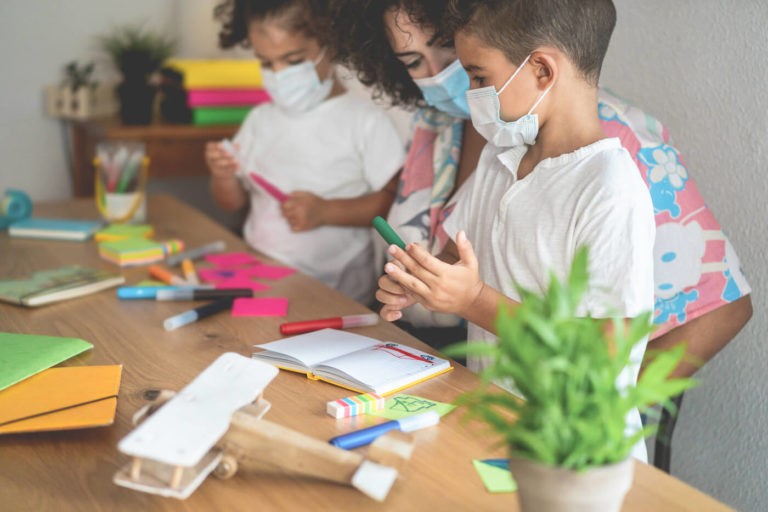From the minute a child is born, they start learning. They learn about their surroundings, their support systems, and where they receive their love. Children rely on their parents, family members, daycare providers, and relationships to help positively shape their first several years of experiences. How the brain grows and develops depends largely on other people and the world around the child. And because 90% of brain growth happens before Kindergarten, primary skill development is not something to be taken lightly. Continue reading on for the brain development that takes place in early childhood, effects of delayed brain development, and early childhood activities to try in the early childhood classroom (First Things First).
Brain Development in Early Childhood
Thinking about early childhood brain development, different areas of the brain are responsible for different abilities such as language, movement, and emotion. These abilities develop at different rates and build off of themselves. These connections will eventually link together in more complex ways, just as when children age they are able to think and act and move more complexly. These essential brain connections that form during early childhood are much more difficult to form later in life. Which is why it is so important for children to be nurtured, loved, and supported from birth on. When children have a strong foundation supporting them and helping them grow, they can gain those necessary primary skills such as social and emotional growth, goal-directed behaviors, attention and focus, and executive functions (First Things First).
Effects of Delayed Brain Development in Early Childhood
At birth, children start asking for engagement from their parents and caregivers. They coo, smile, and cry. As they grow into toddlers, they start to be more direct about their needs and wishes. Each time a child asks for an adult’s attention, it is an opportunity to help positively develop their brain by being responsive to the child’s needs. Also known as the “serve and return” process, this communication is fundamental to the wiring of the brain. When a safe, stable or nurturing environment does not exist, a child’s brain development is negatively impacted. Adverse childhood experiences such as poverty, violence, or lack of access to early learning experiences greatly impact the child’s path towards success.
Early Childhood Activities to Try in Your Early Childhood Classroom
To help support a child’s brain development in the early years, there are an abundance of valuable activities to try either at home or in a classroom. Below are some ideas to get you started.
Fruit Facts
A simple way to build vocabulary is by describing the foods you are eating at home or having during snack time at school. Pick up a piece of fruit and play a guessing game. “The fruit I am holding is red, crunchy, and grows on a tree. Can you guess it?” Use words your child is familiar with, and some your child is not. Then, switch roles. Ask your child to choose a food on their plate and give you clues to guess.
Pattern Fun
Patterns are everywhere, and a great way to incorporate early math skills into a child’s day. Start a pattern using legos, then ask the child to continue it. If that is too complex, break it down into the vocab used to describe a pattern. “Look, I see red, yellow, red, yellow. That’s a pattern!” Sidewalk chalk is another fun way to draw and explore patterns!
Read
Reading may be the obvious early childhood activity to try, but it is also one of the best ways to promote a child’s brain development. Even before he has developed phonemic awareness, reading jump starts language and communication skills. When a child hears a word and then sees a picture to match, it connects the two in a child’s mind and helps solidify that vocabulary. Repetitive reading further builds recognition between words and images by giving the child multiple opportunities to make connections with the book. As a child progresses in their language development, incorporate questions into reading time. “Where is the dog?” “Point to the boat.” “Why would the boy be bringing his umbrella?” Being able to read and comprehend work hand in hand, and these foundational skills can be laid early on.
Plants
Children are curious creatures about the world around them. Bring awareness to living things by including children in a gardening process. Have them plant a seed and learn what it takes to care for it (grass or brassica seeds are simple starters). Not only does this bring about teachable moments, but also helps build responsibility. Expand these learning moments by pointing out other forms of nature while on a walk, out on the playground, or while reading. Ask the child what a tree needs to survive or what plants do for animals and humans. You may be surprised just how many realizations your child will make!
Baking
Letting children be a part of the kitchen activity is a great way to learn life skills, develop vocabulary, and explore math concepts. If this seems overwhelming to let your 3 year old help you bake cookies, then do a bit of prep work ahead of time. Measure out all the ingredients so they can easily be added to the mixer. Talk about amounts of each ingredient, using their names like teaspoon, tablespoon, or cup. Explain why you have to be precise and how changing a quantity by just a little bit can change the entire taste. Children will love helping you, and will even more certainly love enjoying what you make together.
From the minute a child is born, they are taking in the world around them and learning as they go. The child’s parents, caregivers, and friends all impact the way their brain develops, and there are ways to help ensure that that development is at its highest potential. Early Childhood Education and activities are critical for setting children up for success, not only in the present, but for their futures as well.




